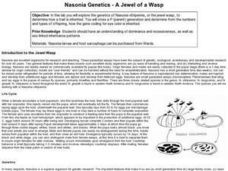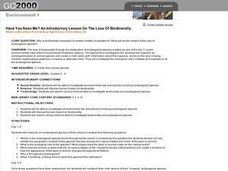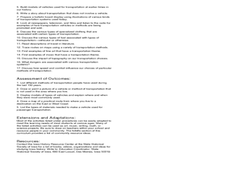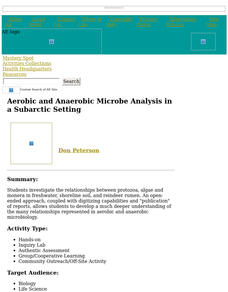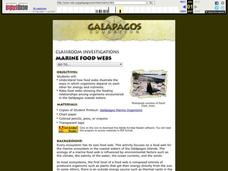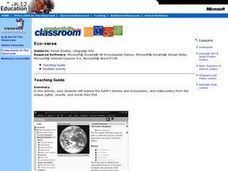Curated OER
How Many Penguins Does It Take? Studying Carrying Capacity and Limiting Factors
How does a population's habitat determine the size of that population? Teach learners about carrying capacity and limiting factors with an engaging roleplay activity. Class members pose as a colony of penguins who must gather food amidst...
Curated OER
Nasonia Genetics-A Jewel of a Wasp
Young scholars investigate the inheritance pattern of eye color in Nasonia wasps. For this genetics and inheritance lesson plan, students read about the life cycle of Nasonia wasps and hypothesize about the possibilities of eye color...
Curated OER
Have You Seen Me? An Introductory Lesson on the Loss of Biodiversity
Students investigate environmental law and policies involving endangered species as well as discuss human impact on biodiversity through an Internet research project. Students create a milk carton of their "missing" endangered species.
Curated OER
Ecosystems - Lessons 1 and 3
In this biology worksheet, students answer 22 multiple choice questions on ecosystem. They identify which ecosystem component is described in each of the question.
Curated OER
Vocabulary: Kansas Prairies
Students explore the ecosystem by reviewing scientific vocabulary terms. In this environmental awareness activity, students identify the differences between abiotic and biotic factors and their relationship to the Earth. Students define...
Curated OER
Mussel Anatomy Lesson Plan
Students identify the parts and functions of a mussel. They explain how its physical adaptations help it survive in its habitat. They label the parts as a quiz to complete the lesson.
Curated OER
Observation: It's A Natural!
Students play the role of naturalist in their own community just as Thoreau was in his. They observe their communities looking for positive and negative aspects on the environment. They work together in groups to complete a model for...
Curated OER
California Biodiversity
Students examine several maps of California exhibiting features such as precipitation, topography, and vegetation. They look for patterns that might be the source of or influence biodiversity in different regions. They pay particular...
Curated OER
What Structures and Behaviours Can Be Observed in Vinegar Eels?
Students view vinegar eels under a microscope at different magnifications. They use a DigiScope with the camera attachment in place of the eyepiece. Students count the number of thrashing movements in 10 seconds. They repeat this three...
Curated OER
Discovering Owls
Students are introduced to different types of owls and owl pellets. They list several adaptations that benefit the owls. Students identify the various species of owl that live in Wisconsin. Students discuss owl pellets and identify the...
Curated OER
Wildlife Habitat
Students examine habitats and describe their elements. In this wildlife habitat instructional activity students study the factors that affect habitat and write a short report.
Curated OER
Getting from Place to Place
Students examine modes of transportation. In this transportation instructional activity, students listen to their instructor present a lecture on modes of transportation over the past 300 years. Students respond to questions about the...
Curated OER
Aerobic and Anaerobic Microbe Analysis in a Subarctic Setting
Students investigate the relationships between protozoa, algae and monera in freshwater, shoreline soil, and reindeer rumen. They publish reports of their findings.
Curated OER
A Natural Habitat: What, How and Why
Students understand what a habitat is. They determine why a habitat is important to our environment no matter where it is located. Students observe and recognize natural habitats in their surroundings.
Curated OER
A Fish in Water
Water is essential to all living things. This classroom experiment lets everyone observe goldfish and discuss what fish need to live, like food & clean water. They then listen to the book, Fish Out of Water, and compare the fictional...
Curated OER
Marine Food Webs
Students examine how food webs illustrate the ways in which organisms depend on each other for energy and nutrients, and make food webs showing the feeding relationships among organisms encountered in the Gal??pagos coastal waters.
Curated OER
Biomes -- Part II
Learners use the internet to gather information on the biomes of the world. They identify the climate and unique characteristics of each biome along with any threat to them. They create their own campaign to preserve wildlife.
Curated OER
Information Fluency Unit
Fourth graders, after defining the task and searching for some creative strategies, role play being a Park Ranger who tries to save Big Bend from being removed from the National Park system in Texas. They support the keeping of Big Bend...
Curated OER
Vegetarianism
Students classify ways to stick on a vegetarian diet. Students survey the reasons why others make it or fail on these types of diets. Students aim to improve their understanding of vegetarianism.
Curated OER
Lake and Pond Study
Learners examine the habitat and community structure of a pond that could support Ospreys through games and worksheets. They then go on a field trip to a pond to evaluate the suitability of the pond as an Osprey habitat.
Curated OER
Eco-Poetry
Students explore the Earth's various biomes and ecosystems using Internet research. They create a multimedia poem using the photos, sounds, and vocabulary from their research.
Curated OER
Photosynthesis
Fourth graders discuss and identify the components of photosynthesis and the products of this process. They participate in a class discussion about the importance of oxygen, and in small groups act out the process of photosynthesis. ...
Curated OER
Rock-a-bye Babies in a Wetland
Learners review the way human babies grow and what type of care they need. Using the internet, they are introduced to five different wetland habitat animals and how their babies grow. They discover how they are born and what the...
Curated OER
Population Density
Students use the scientific method to conduct an experiment and use varied methods to gather background information. They correctly use lab equipment and prepare tables and graphs that organize, conclude, and present their findings. ...



